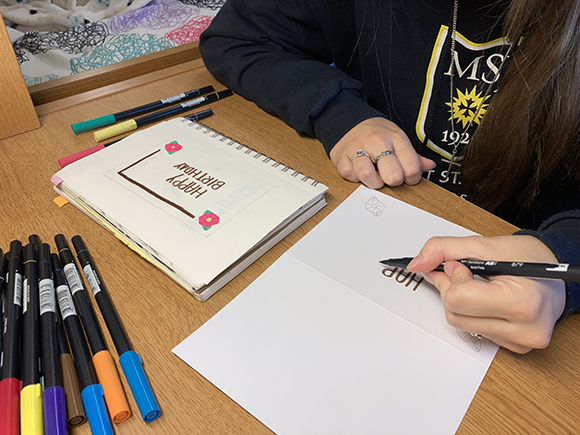Artificial intelligence is becoming a growing contributor to creative content, raising concerns and implications for those in education and the arts.

With the rise of new tech and artificial intelligence like ChatGBT, Muse Net, or DALL-E, both the arts and education will undoubtedly be impacted in some sort of way. In light of this idea, I followed up about the ideas of the evolving digital world with Mark McCafferty, the Chair of the Department of Music, and Swati Chopra, an Assistant Professor in the Department of Art and Design.
Intriguingly, they both had several contrasting opinions regarding their fields. In the world of design, Chopra believed AI would, more so than positively, have a negative impact on the way we go about creating and experiencing art.
“We could be generating art, but what it is doing is copying existing arts, and making a similar but different version. It’s more plagiarism than art,” she says.
In other words, while AI can produce never-before-seen art, it is always going to be a derivative of another piece.
Would Chopra consider AI creations to be art at all? “I would call them art like, not art. I think it would require human thought, where there are real humans behind it. Although humans have coded it, no, AI is thinking on a different tangent.”
McCafferty, however, believed the opposite. Did he artificial intelligence created material as art? “Yes, defining something as art, wherever the source comes from, may be controversial to begin with, and the definition of what is art and what is music has been a constant source of tension. Some people continually stretch the boundaries searching for a new sound, why is that any different from when an AI stretches those boundaries?” he says.
Their beliefs here are so different, and that's what makes these questions so complex. It becomes a game of definitions. Chopra believes it takes raw humanity to make something capable of being considered art. On the contrary, McCafferty even brings up the idea of aleatoric music, a form of music based on randomness and sheer freedom. Many people would hesitate to consider this real music. Music isn’t something so easily defined, it is a debate that has existed forever, and it is often a game of tension and definition.
Despite disagreements, they agree, at least on some level, that human art and creation is here to stay. There is often a fear that AI may take over lots of what humanity considers to be what makes it unique.
Chopra says, “When it comes to AI it will have an initial phase, but soon after humanity will triumph.” She believes AI may be a struggle at first that will eventually become overturned. She provided an example of a logo generator, a tool that was used to automatically generate logos based on keywords.
“A lot of thinking goes into a logo that is impactful, so most of the logos that ended up being generated weren’t used,” she says. This an interesting and complex insight to how people will often value the thought and effort that only a human can provide.
Speaking in a similar vein, McCafferty mentioned the idea that humanity will evolve alongside technology. The growth of this technology “will likely, and sadly, nullify the need for many of the industry’s jobs, but just like any other technology, new different jobs and careers will appear alongside it. Long ago you used to be unable to listen to music unless you were with a live performer, but nowadays streaming services, a multi-billion-dollar industry, allow music to be played at your fingertips. You can have the artist essentially in the same room as you with the click of a button.”
McCafferty seems to also believe that there will be turbulence with the rise of newer and newer technology, but it won’t inhibit the freedom that people have to create.
McCafferty started our interview by reminding me that AI already influences our lives on a day to day basis. With the use of algorithms, we are constantly exposed to new information that is recommended to us.
“Another way that that is becoming more widespread, is that those tracks themselves are influenced by AI,” he says. “Both mixing and mastering in music would be done by two different people. Nowadays it is very common that people shop out the mixing or the mastering to an AI. You upload the raw mix, you select a certain sound profile or a certain venue and it may just be brute force AI shaping that frequency wave into a ‘mastered’ track. Sometimes those results are very, very good, and you often can’t tell if it was man made or done by AI.” Both McCafferty and Chopra believe that AI will have lasting impacts on education that will become difficult to deal with, but believe that we can get through it. Furthermore, they both believe on a worldwide standpoint, artificial intelligence is a tool that we could use to improve ourselves and our lives, not something that we should feel the need to fear.
